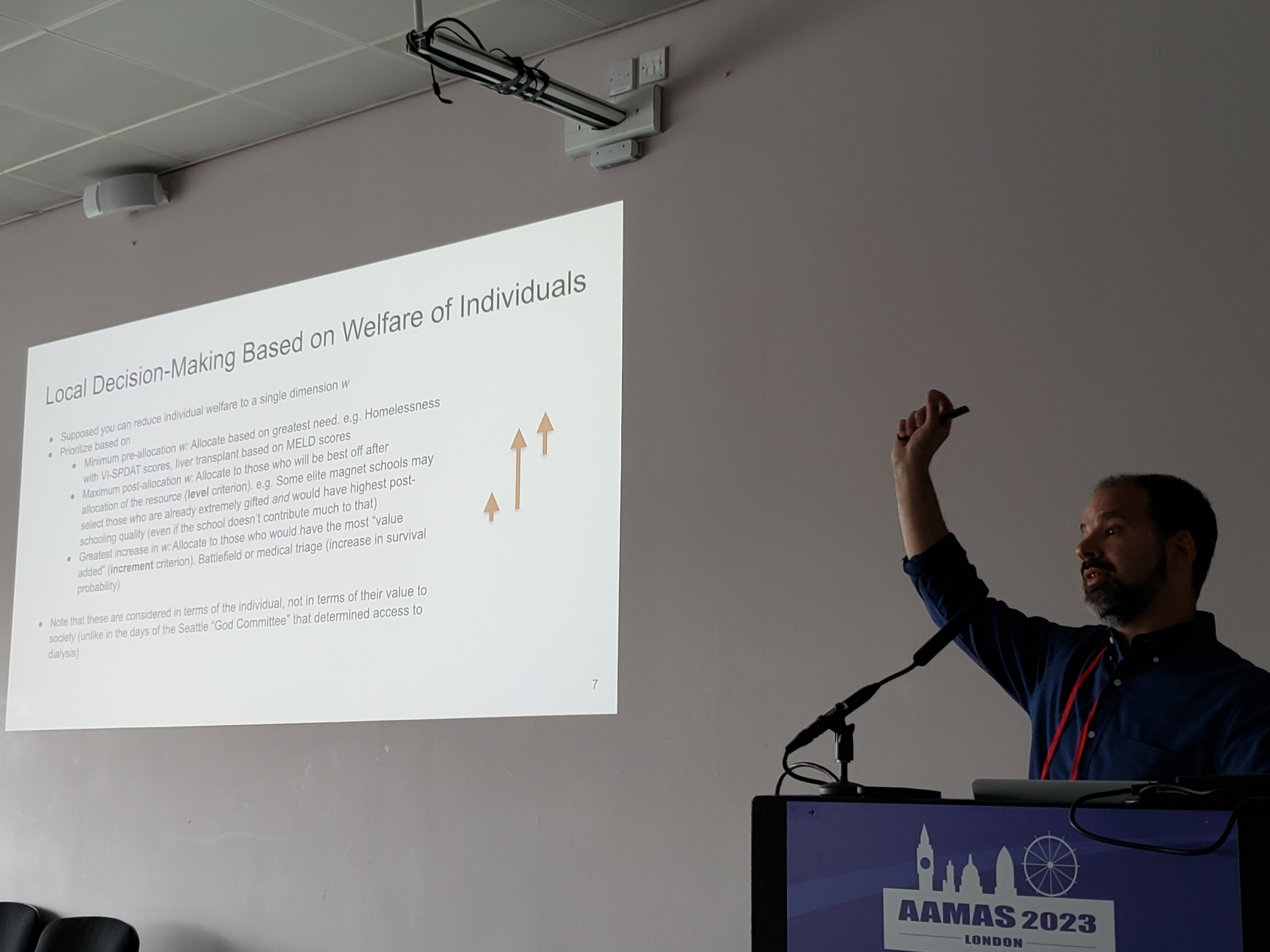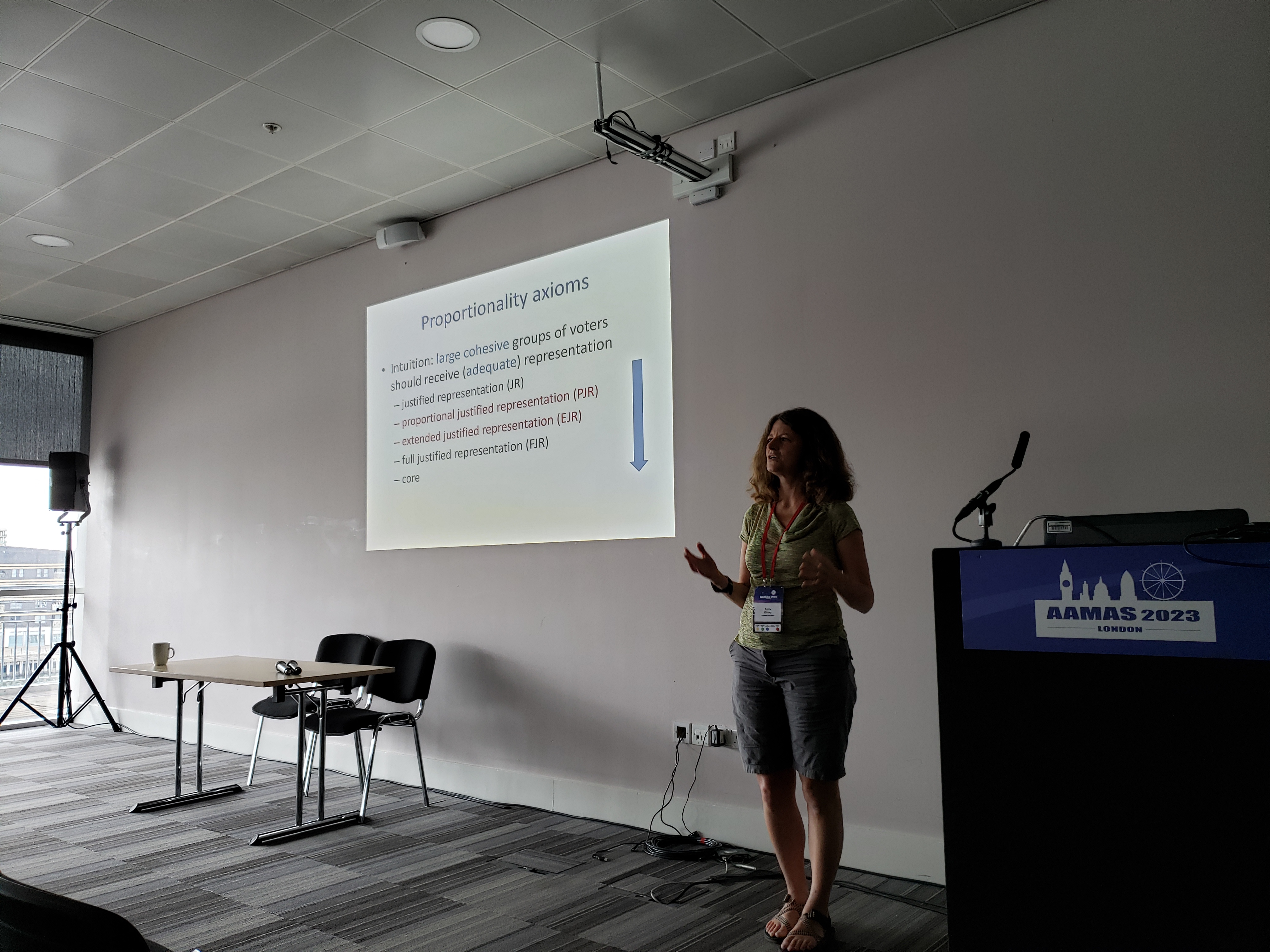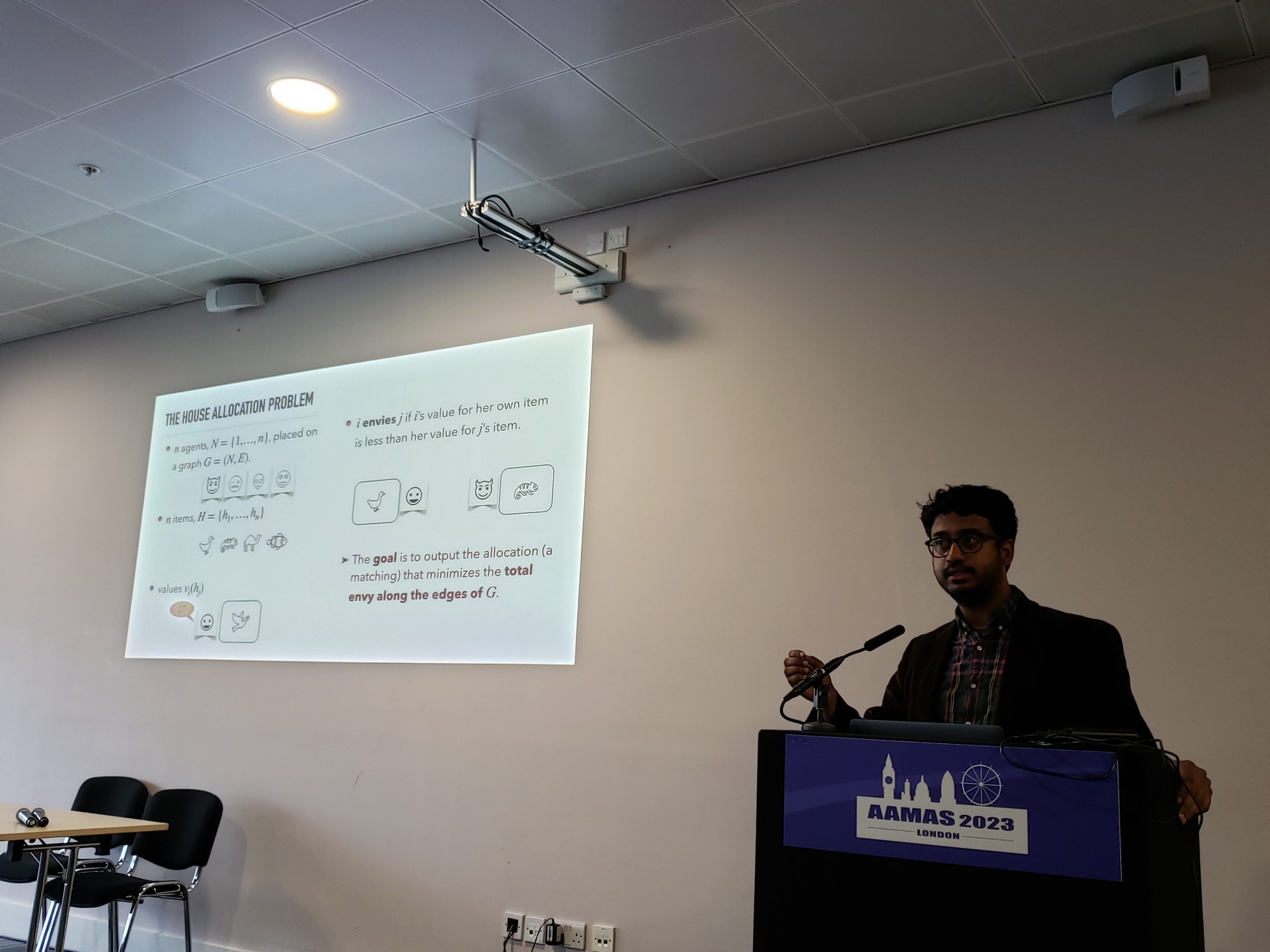The 5th Games, Agents, and Incentives workshop will be held at AAMAS 2023 in South Gallery 13+14 of the London ExCeL conference centre on Tuesday, May 30th.
Some Photos from the Workshop



Full Schedule - Tuesday, May 30
| Time | Session | Topic | Structure |
|---|---|---|---|
| 8:30-9:30 | Keynote by Zoi Terzopoulou | Incompleteness in Collective Decision Making | Keynote |
| 9:30-10:00 | Session 1 | Fair Division | 15 min x 2 |
| 10:00-10:45 | Coffee Break | ||
| 10:45-11:15 | Session 2.1 | Games, Markets, and Cooperation | 5 min x 6 |
| 11:15-12:30 | Session 2.2 | Games, Markets, and Cooperation | 15 min x 5 |
| 12:30-14:00 | Lunch Break | ||
| 14:00-15:00 | Keynote by Sanmay Das | Efficiency, Fairness, and Incentives in Scarce Societal Resource Allocation | Keynote |
| 15:00-15:45 | Session 3 | Games, Clustering, Networks, and Scaling | 15 min x 3 |
| 15:45-16:30 | Coffee Break | ||
| 16:30-17:00 | Session 4.1 | Voting, Peer Review, and Networks | 5 min x 6 |
| 17:00-18:30 | Session 4.2 | Voting, Peer Review, and Networks | 15 min x 6 |
| 18:30— | AAMAS Opening Reception | South Halls Entrance S2 |
8:30-9:30 | Keynote - Incompleteness in Collective Decision Making
Speaker: Zoi Terzopoulou
Abstract: Incomplete individual opinions arise in many real-world settings that involve group decision making. From presidential elections and procedures for participatory budgeting, to online polls and crowdsourcing experiments, the participating members of a group may not be able to express a preference between some of the alternatives that are presented to them, or may not even be aware of the existence of all available alternatives. In this talk I will give an overview of problems that arise in the field of computational social choice when the goal is to aggregate incomplete preferences or judgments, and I will discuss some recent attempts towards their solution.
Speaker Bio: Zoi Terzopoulou is a junior professor at the Saint-Etienne School of Economics, in France. Her research revolves around Computational Social Choice, with a focus on fine-grained formal models capturing realistic collective decision making. She previously was a postdoctoral researcher at the University of Paris-Dauphine holding an individual European fellowship. Before, she was awarded a PhD diploma from the University of Amsterdam in the Netherlands, where she also obtained a MSc degree in Logic. She holds a BSc degree in Mathematics from the University of Athens, in Greece. She has published extensively in prestigious venues both in Computer Science and Economics—notably in IJCAI, AAAI, AAMAS, the journal of Social Choice and Welfare, Journal of Mathematical Economics, and Journal of Autonomous Agents and Multiagent Systems.
9:30-10:00 | Session 1
| Time | Title | Authors | Link |
|---|---|---|---|
| 9:30-9:45 | Thou Shalt not Pick all Items if Thou are First: of Strategyproof and Fair Picking Sequences | Sylvain Bouveret, Hugo Gilbert, Jérôme Lang, Guillaume Méroué | |
| 9:45-10:00 | Fair Distribution of Delivery Orders | Hadi Hosseini, Shivika Narang, Tomasz Wąs |
10:45-12:30 | Session 2
| Time | Title | Authors | Link |
|---|---|---|---|
| 10:45-10:50 | Deep Reinforcement Learning and Influenced Games | Colin Brady, Rica Gonen, Genadi Rabinovich | |
| 10:50-10:55 | |||
| 10:55-11:00 | Social Optimum Equilibrium Selection for Distributed Multi-Agent Optimization | Duong D Nguyen, Langford White, Hung Nguyen | |
| 11:00-11:05 | Game Implementation: What Are the Obstructions? | Jiehua Chen, Sebastian Vincent Haydn, Seyedeh Negar Layegh Khavidaki, Sofia Simola, Manuel Sorge | |
| 11:05-11:10 | Decision Theory Using Mechanised Causal Graphs | Decision Theory Using Mechanised Causal Graphs - Matt MacDermott, Tom Everitt, Francesco Belardinelli | |
| 11:10-11:15 | A Fair Dynamic Pricing Policy for the Hotel Industry | Errikos Streviniotis, Athina Georgara, Filippo Bistaffa, Georgios Chalkiadakis | |
| 11:15 - 11:30 | A Comparative Study of Elicitation Granularity in Prediction Markets Under Trader Misinformation | Noah Lincke, Mithun Chakraborty, Sindhu Kutty | |
| 11:30-11:45 | Global Min-Max Computation for α-Hölder Zero-Sum Games | Aurélien Delage, Olivier Buffet, Jilles Steeve Dibangoye | |
| 11:45-12:00 | A Novel Approach of Credit Based Compensation Scheme Modelling in International Kidney Exchange | Xin Ye, Márton Benedek, Peter Biro, Daniel Paulusma | |
| 12:00-12:15 | Improving Quantal Cognitive Hierarchy Model Through Iterative Population Learning | Yuhong Xu, Shih-Fen Cheng, Xinyu Chen | |
| 12:15-12:30 | Improved Coordination with Failsafes and Belief-Conditioned Programs | Jesse Clifton, Anthony DiGiovanni |
14:00-15:00 | Keynote - Efficiency, Fairness, and Incentives in Scarce Societal Resource Allocation
Speaker: Sanmay Das
Abstract: Artificial intelligence and machine learning are increasingly used to aid decision-making about the allocation of scarce societal resources, for example housing for homeless people, organs for transplantation, and food donations. Recently, there have been several proposals for how to design these systems in ways that attempt to achieve some combination of fairness, efficiency, incentive compatibility, and satisfactory aggregation of stakeholder preferences. In this talk I will give an overview of my group’s research in this space, informed by the theories of local justice and of street level bureaucracy, and present some research vignettes. The first vignette is about theoretical and empirical results demonstrating necessary group fairness trade-offs in the context of scarcity. The second focuses on the incentives for misrepresentation created by fair machine learning algorithms that attempt to balance prediction accuracy and some notion of equity across groups. The third characterizes human preferences when prioritizing households for scarce resource allocation, and tests the impact of providing human decision-makers with algorithmic advice. Taken together, these results and, more broadly, this kind of research, can inform policy around the use of AI/ML algorithms as decision support tools in high-stakes allocation of social services.
Speaker Bio: Sanmay Das is Professor of Computer Science and Co-Director of the Center for Advancing Human-Machine Partnership at George Mason University. He has broad interests across AI, machine learning, economics, and computational social science. Dr. Das is chair of ACM SIGAI and a member of the board of directors of IFAAMAS. He was program co-chair of AAMAS 2017 and is currently serving as program co-chair of AIES 2023 and associate program co-chair of IJCAI 2023. He serves as an associate editor of ACM TEAC, JAIR, and JAAMAS, and will join the DARPA ISAT Study Group in 2023. He has been recognized with several awards for research, teaching, and service, including an NSF CAREER Award, the Department Chair Award for Outstanding Teaching at Washington University, and the Department of Computer Science Outstanding Service Award at George Mason University. He holds a Ph.D. from MIT, and a Bachelor’s degree from Harvard.
15:00-15:45 | Session 3
| Time | Title | Authors | Link |
|---|---|---|---|
| 15:00-15:15 | ~~~ | ~~~ | ~~~ |
| 15:15-15:30 | Group Fair Clustering Revisited—Notions and Efficient Algorithm | Shivam Gupta, Ganesh Ghalme, Narayanan C Krishnan, Shweta Jain | |
| 15:30-15:45 | On the Price of Fairness of Allocating Contiguous Blocks | Ankang Sun, Bo Li |
16:30-18:00 | Session 4
| Time | Title | Authors | Link |
|---|---|---|---|
| 16:30-16:35 | Into the Unknown: Assigning Reviewers to Papers with Uncertain Affinities | Cyrus Cousins, Justin Payan, Yair Zick | |
| 16:35-16:40 | Pandering in a (Flexible) Representative Democracy | Ben Abramowitz, Nicholas Mattei, Zizhan Zheng, Xiaolin Sun, Jacob Masur | |
| 16:40-16:45 | Pairwise Distortion and the Independence of Irrelevant Alternatives | Théo Delemazure, Grzegorz Pierczyński, Jérôme Lang | |
| 16:45-16:50 | Agreement Among Proportional Approval-Based Multi-Winner Voting Rules: An Empirical Analysis | Jannik Reichert, Edith Elkind | |
| 16:50-16:55 | Heuristics for Opinion Diffusion via Local Elections | Rica Gonen, Martin Koutecky, Roei Menashof, Nimrod Talmon | |
| 16:55-17:00 | Gerrymandering Bounds Beyond Two Parties | Ruth Ariel, Omer Lev | |
| 17:00-17:15 | Refined Characterizations of Approval-Based Committee Scoring Rules | Chris S Dong, Patrick Lederer | |
| 17:15-17:30 | The Limits of Smart Voting in Liquid Democracy | Giannis Tyrovolas, Edith Elkind | |
| 17:30-17:45 | Proxy Voting for Better Outcomes | Gili Bielous, Reshef Meir | |
| 17:45-18:00 | Closeness centrality via the Condorcet Principle | Oskar Skibski | |
| 18:00-18:15 | Incentive-Based Efficient Solutions for Public Goods Games | Yair Vaknin, Amnon Meisels | |
| 18:15-18:30 | Graphical House Allocation | Hadi Hosseini, Justin Payan, Rik Sengupta, Rohit Vaish, Vignesh Viswanathan |